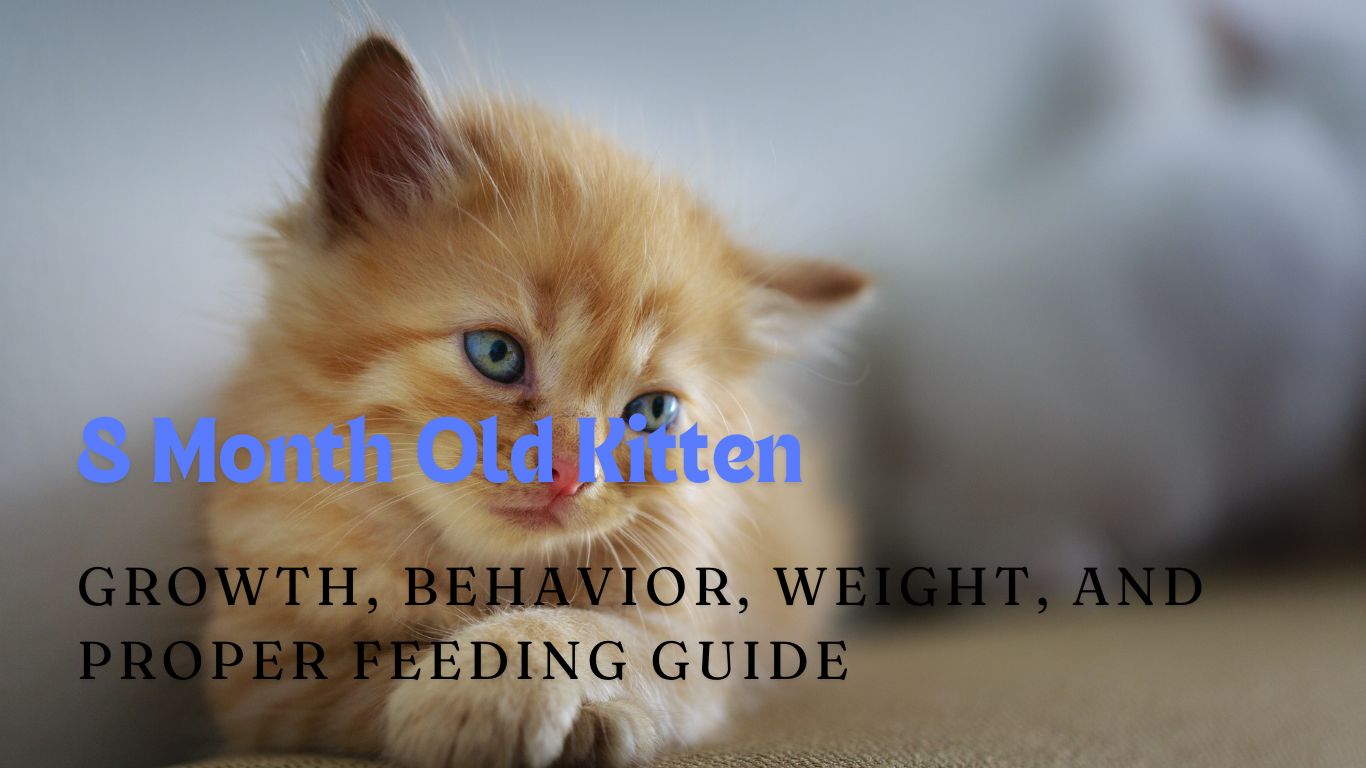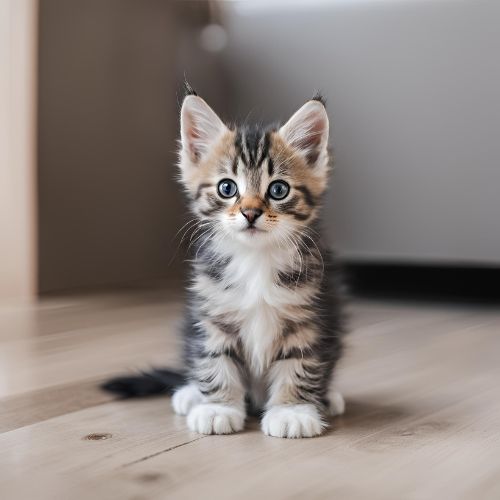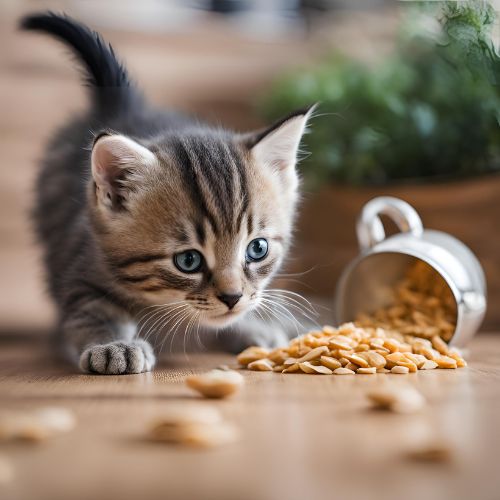
Now that your kitten is eight months old it is neither a baby nor a fully grown adult. Your kittens size, personality and nutritional requirements alter throughout this time. If one wants to ensure that an eight months old kitten continues to grow and develop properly it is important to understand its’ weight, feeding routine, and behavior. Here is what you should know about your eight months old kitty.
8 Month Old Kitten Size
This kitten must have grown much since it was still an early kitten at just 8 months of age. At this time most of the kittens will be from ¾ to ¾ inch of their full-grown size. However large or small depending on breed and genetics, an 8 month old kitten is lighter and more energetic than a young adult cat. For instance, smaller breeds of cats and domestic short-haired cats may be nearer the perfect size of a kitten, but out breeds like the main coon still have a lot of growing to do.
An 8 month old kitten has better body and limb size, height and muscularity compared to a younger kitten. That is why you will realize that their limbs are much more muscular than before and they may even begin to.balance; appear physically balanced again in comparison to how they were some few months back. This is the puffy stage that is crucial in attaining the right bone density and muscles and therefore, is the time that they require food most of the time.

8 Month Old Kitten Behavior
Kittens are active, playful, and curious and at 8 months of age, but above this age, there are changes from the normal behaviors that a kitten will exhibit as it grows to adulthood. Grooming will also be a daily segment in your 8 months old kitten’s schedule because they are playful. Interactive games climbing frames toys will help children be busy most of the time in their constructive play.
At this age many kittens mat, for example, start biting or scratching. You might also recognize that they appear to be more stubborn, or dominant especially if they have not been neutered or spayed. Unaltered female cats may ovulate and uncastrated males can begin to become aggressive about protecting the area they inhabit. Socialization is still important at this stage, so teaching and encouraging good behavior and eradicating bad ones goes a long way into creating an agreeable adult cat.
The eight month old kittens may look as if they will not need your support anymore, but it is not true actually. It makes them happy and well-behaved and also improves your bond in case you spend time with them.
How Much Should an 8 Month Old Kitten Weigh?
A kitten at this age stands for 4-5 months of age and typically weighs between 5 and 8 pounds; but it can also be dependent on breed, genetics, and feeding. Maine Coon breeds and other large breed cats may weigh more by this age, they may even gain up to 10 pounds or more by this age while small breeds or cross breeds cats may be on the lighter size. This is a time when a kitten’s growth rate does not increase as it did during the first half of his life up to six months of age. But they are still progressing physically and could hit adult weight at about one year or even beyond for giant breeds.
At this age, juvenile’s body should be muscular, have a crown rump ration of six- six and half and should not be emaciated. Other conditions require diet and exercise for the body to grow and develop in the right manner as they should. Taking them often for vet check, they will be advised if they are underweight or overweight for their age and breed, plus a direction on feeding.
8 Month Old Kitten Weight Fluctuations
If maybe you want to know your kitten’s growth progress, then it is helpful to weigh him often. Depending on the breed, an 8 month old kitten’s weight should mostly be within the range of 1 – 8 pounds. A for example the domestic short haired cat might weigh less than the Maine Coon cat because they are larger in size. If you are unsure if your kitten’s weight is healthy, you should consult with your veterinarian for some guidance on whether or not your baby is growing as it should.If maybe you want to know your kitten’s growth progress, then it is helpful to weigh him often. Depending on the breed, an 8 month old kitten’s weight should mostly be within the range of 1 – 8 pounds. A for example the domestic short haired cat might weigh less than the Maine Coon cat because they are larger in size. If you are unsure if your kitten’s weight is healthy, you should consult with your veterinarian for some guidance on whether or not your baby is growing as it should.
Injury or a new disease, lifestyle changes such as change in diet or movement level, could also have triggers that cause weight differences in a kitten. In order to eliminate all potential problems, it might be helpful to make an appointment with a veterinarian, if your kitten is putting on, or losing, a lot of weight.

How Much to Feed 8 Month Old Kitten?
Actually, the feeding technique applied when feeding a kitten of eight months is different that when feeding a younger kitten. While they basically transition from kitten food to adult food at this age they still have their nutritional requirements fully met. An ideal diet that has to be sustained so as to ensure continuous progress is a must.
The reason for this is that kitten food has more protein, fat and calories per calorie which your 8 month old kitten needs to grow. Most of the time, based on the metabolisa and activity level of your kitten, the kitten should be fed three to four small meals a day. As with all food, always follow the feeding levels on the food packaging so that regardless of how much food your kitten has eaten, you will always be able to keep tabs on how much your kitten is eating.
Additionally, at this age, you can also gradually mix kitten and adult food but you can’t complete the switch overnight. Kittens have upsets of the stomach due to abrupt dietary changes because of their sensitive digestion.
Hydration and Nutrition for an 8 Month Old Kitten
Perhaps most importantly, your kitten should be fed enough food and stay hydrated. Although wet food provides much needed hydration, they do not make up for the lack of dinner they will need dry kibble for. By this age, all kittens need access to clean, fresh water to help ensure good hydration.
As far as nutrition goes, consider feeding your cat high quality, protein, healthy fat, and the necessary taurine (for heart, and vision health). It’s not a good idea to feed your kitten human foods, as many common ingredients are harmful to them.
Conclusion
It is thrilling and fulfilling experience to raise an 8 month old kitten. As you continue to monitor the weight of your kitten and make changes to the diet as she grows and more distinct behaviors appear and she matures, it’s very important to keep an eye on her weight. If you give your kitten a stimulating environment with proper food he will thrive through this phase of growing into adulthood.
